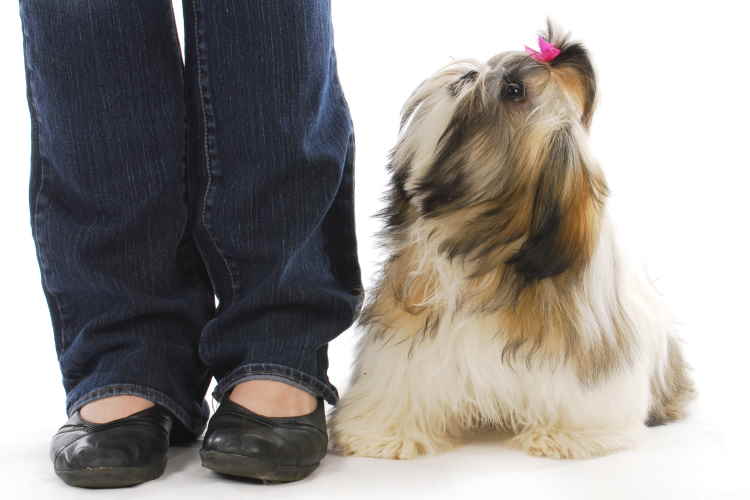Shih Tzu Puppy Training Tips
10 Tips for Beginners to Get the Most from Your Training Sessions
BY MOLLY | EVERYTHINGSHIHTZU.COM
This post may contain affiliate links. Read privacy & disclosure policy for info
When it comes to training your Shih Tzu, doing it on your own can be an excellent way to build your relationship and bond with your pup.
However, Shih Tzu have been known to possess a stubborn streak, so if you jump in ill-prepared, training your dog can also become very frustrating.
 Puppy training tips
Puppy training tipsWhether your Shih Tzu is eager to learn or she would rather cuddle up on the couch, here are some puppy training tips to help you get the most from your training sessions with your puppy.
1. Start as soon as possible
When you first get your Shih Tzu is the perfect time to start training.
In other words, don't wait; you need to establish rules, limits, and expectations from the very start so your dog knows exactly what you want.
If you have a young puppy, that's even more reason to start as soon as possible, before she has time to pick up any bad habits.

2. Establish a puppy schedule
A dog likes to have a sense of control over its environment. When a pup knows what to expect and what comes next, they feel safer and more secure.
Establishing a schedule from the very beginning of your relationship is the perfect way to provide this sense of control.
Your schedule should include times for eating, playing, exercise, sleeping, training sessions, and designated potty times - this will be a HUGE help with potty-training your pooch.
Having a schedule also helps your dog adapt to her new environment more easily and can help with things like sleeping through the night, eating at appropriate times, and staying out of mischief.
A puppy schedule also ensures your dog is getting ample opportunities for play and exercise, which helps keep her from getting bored.
A bored dog ends up being a dog that misbehaves, chews up furniture, barks at everyone that passes by, and basically, isn't as happy a dog as she could be.
When your pup engages in enough activity throughout the day and receives proper stimulation, it gives her the chance to blow off some steam.
Then, she is less distracted during training sessions, better behaved, and all-around a happier pup.
3. Introduce a crate
When you get a puppy, crate training is very beneficial to help your new family member adjust to her environment, understand her boundaries, become potty-trained, and stay safe.
The crate you select should be big enough for your pup to lie down, stand up inside, and turn in a circle, but not much larger, so she isn't tempted to use it as a bathroom.
Incorporate your pup's time in her crate into your puppy schedule, and as your dog gets used to the rules, the crate door can remain open, so she recognizes it as her special safe zone.
4. Get solid with potty training
If you've implemented all of the above steps, then you should be well on your way to having a potty-trained puppy, but make sure that your dog is fully house-trained before you jump into teaching her a whole bunch of tricks.
It's important that your pup understands its boundaries and knows exactly where their bathroom is.
Plus, when your dog is well-trained and has regular opportunities to use the potty, this will help them to be more focused when it comes time to train.
5. Build a strong foundation in the basics
As cute and fun as it might be to have a dog that can dance, roll over, and speak on command before you start working on these more entertaining tricks, it's important that your Shih Tzu have a strong foundation in basic dog training commands.
Beginning commands like sit, stay, come, leave it, down, and heel are not only critical for creating a well-behaved pup, but they also keep your dog safe.
Plus, many of these basics are used as the first step in more difficult tricks.
6. Stay positive
Use positive reinforcement when training, think praise and your pup's favorite treats, and if you feel yourself getting frustrated, then it's time to take a break.
Keep your training sessions with your dog positive, so your pup stays engaged and focused.
Your dog needs to associate training with something good, not something that ends with her getting yelled at or punished.
7. Always be consistent
One of the most important things to remember when teaching your canine companion is to be consistent.
For example, if you use a specific verbal cue for a command, make sure it is the only one you use.
The same goes for hand signals.
If you set a particular rule in place, it needs to apply all of the time, not just now and then.
If you don't stay consistent, your dog will be confused and uncertain of what you want her to do, leading her to guess or just do her own thing.
8. Stay calm, cool, and collected
No matter what you teach your pup, whether it's potty training, how to sit, or to stop chewing on your shoes, you need to stay calm.
Keep your voice firm but upbeat; don't let anxiety or stress enter into your attitude because your dog can sense these emotions and will start to react to them.
9. Practice makes perfect
Once your pup has a command down, don't just stop.
Your dog needs to perform the commands on a regular basis so that they stay fresh in its mind.
Basically, don't assume your dog will remember a command forever if they are never expected to perform the behavior.
10. Don't hesitate to call in a pro
Sometimes, even the best intentions end in frustration.
For example, if you gave your all to training your Shih Tzu, and you just are not seeing the results that you want, or you are getting upset with the situation, then it's time to call in a pro.
You can get recommendations from your vet, take a group class where you can still work with your pup under the guidance of an expert, or even hire a private trainer to work with your dog.
In addition to talking with your vet, the Association of Professional Dog Trainers is also a good starting point.
You can also find several dog apps that offer training tips, like Puppr.
One thing is for sure, training your dog is an essential part of being a pup parent.
When you teach your Shih Tzu how to be a well-behaved dog, it helps keep them safe and you in control, making them and you a lot happier!
Here's wishing you much success in training your Shih Tzu puppy!



